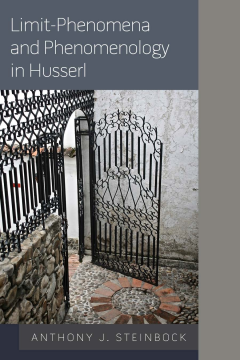
Additional Information
Book Details
Abstract
Recent discussions around limit-problems, namely the questions concerning what can appear in phenomenological reflection, as well as what phenomenology as philosophical reflection can handle, call for a concerted treatment of the problem of limit-phenomena. In this important new book, Anthony J. Steinbock, a leading voice in contemporary phenomenology, explores that question in the context of an interrelated series of problems in Husserl’s phenomenology. Representing a continued struggle with these insights and problems, the first section sketches out the problem of limit-phenomena, and addresses generally that rich estuary of liminal experience that commanded Husserl’s attention in his research manuscripts. The book goes on to offer a correlative reflection on the issue of method and finally explores a specific set of what have been called recently “limit-problems” within phenomenology, relating to the problem of individuation and on a more personal level, vocation. This rich and timely volume offers an excellent demonstration of phenomenology in practice.
Steinbock's book is a major contribution that will help us to develop the future of phenomenology in a new key. It not only offers a lucid introduction into generative phenomenology and a careful reassessment of phenomenological key concepts, but also succeeds in unfolding the true promise of generative phenomenology, that is, its yet undiscovered normative potentials.
Michael Staudigl, Head of Research, Department of Philosophy, University of Vienna
Steinbock’s Limit-Phenomena and Phenomenology in Husserl is both a fine contribution to Husserl scholarship and a rich, original exploration of important phenomenological themes. Steinbock systematically and masterfully elucidates Husserl’s meditations on the nature of limit phenomena (birth, death) and the verticality or transcendence that characterizes human experience. Steinbock also demonstrates that phenomenology needs new tools to articulate these phenomena in their modes of givenness, tools Steinbock develops in new and stimulating ways. A most valuable contribution to phenomenology.
Dermot Moran, Professor of Philosophy, University College Dublin
Anthony J. Steinbock is Professor of Philosophy and Director of the Phenomenology Research Center at Southern Illinois University, Carbondale. His many publications include Moral Emotions (2014), Phenomenology and Mysticism (2007), Home and Beyond: Generative Phenomenology After Husserl (1995) and the English translation of Husserl's Analyses Concerning Passive and Active Synthesis (2001).
Driven by an attempt to consider things in themselves and in the general framework of a generative phenomenology, Steinbock considers in an insightful way the emergence of limit-phenomena. This book does justice to the author’s profound conviction that phenomenology has to be open to all types of given and givenness.
Mariano Crespo, Universidad de Navarra
Table of Contents
| Section Title | Page | Action | Price |
|---|---|---|---|
| Limit-Phenomena and Phenomenology in Husserl | Cover | ||
| Contents | vii | ||
| Preface | ix | ||
| Part 1: Limit-Phenomena | 1 | ||
| 1 Limit-Phenomena and the Liminality of Experience | 3 | ||
| 2 From Immortality to Natality in Phenomenology: The Liminal Character of Birth and Death | 21 | ||
| Part 2: Generative Method | 37 | ||
| 3 Generative Problems as Limit-Problems of the Crisis | 39 | ||
| 4 Spirit and Generativity: Phenomenology and the Phenomenologist in Hegel and Husserl | 63 | ||
| Part 3: Individuation and Vocation | 97 | ||
| 5 Individuation and the Possibility of Decisive Limits to Experience | 99 | ||
| 6 Vocational Experience and the Modality of the Absolute Ought | 119 | ||
| Afterword | 149 | ||
| Acknowledgments | 151 | ||
| Bibliography | 153 | ||
| Index | 159 | ||
| About the Author | 165 |
